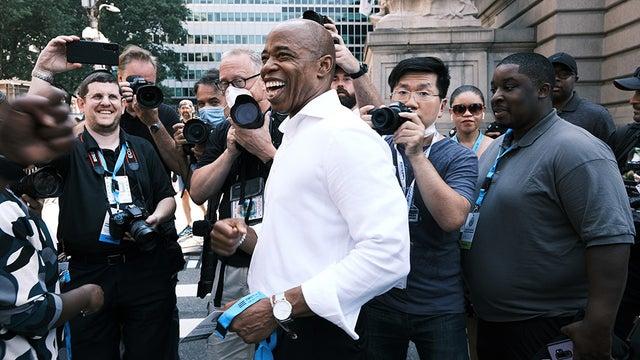
The victory of a centrist candidate in the New York City mayoral primary is raising questions over how far left Democrats should go on the issues of crime and police reform if they want to win in the midterms.
Brooklyn Borough President Eric Adams’s projected win in the crowded Democratic primary field showed that voters in a liberal city were receptive to messaging that mixed a hard-on-crime stance with calls for police reform amid frustration over officer misconduct. His victory came after President Biden beat a slate of more progressive candidates in the 2020 presidential primary who advocated for more sweeping societal changes, including to policing.
Liberals have continued to argue after Biden’s nomination that a strong stance on diverting funds from the police toward other crime-fighting initiatives such as mental health services is key to ultimately reducing crime and winning over progressive voters. But strategists say Democrats running elsewhere could take lessons from Adams, who last month declared himself “the face of the new Democratic Party.”
“One has to be careful before they extrapolate on election results in one area of the country as kind of a wholesale course correction or wholesale case study,” said Democratic pollster Fernand Amandi.
“But I think in this particular case,” he added, “Democrats would be wise to take away some lessons from what Eric Adams proved, which is that you can lean into rhetoric which is tough on crime, supportive of law enforcement, and still win a Democratic primary.”
Adams, a former police captain who served in law enforcement for more than two decades, was projected to be the winner of the primary late Tuesday after a chaotic ranked-choice process dragged out the results. He ultimately edged out his nearest competitor — Kathryn Garcia, another moderate — by roughly 1 percentage point.
Adams played second fiddle to other competitors, including former presidential candidate Andrew Yang, for the early months of the primary battle before the city’s rise in violent crime became the focal point of the race. As polls showed voters began caring more about tackling the surge, Adams started seeing his fortunes rise.
He leaned into his experience in the New York Police Department (NYPD) to promote the importance of having cops on the streets — whose presence he’s campaigned on increasing — while using his experience being harassed by officers as a Black youth to promote reforms in how law enforcement interacts with those it serves.
Adams was also among the most vocal opponents on the trail of the “defund the police” mantra being taken up by the party’s left flank.
“You can have all the reforms you want. You can have a kinder, gentler police department. But if your streets are filled with guns and you’re dealing with a lot of violence, you are still going to have a lot of children being shot,” he told New York magazine in April.
But “if you erode that trust, you are going to erode public safety,” he added.
Adams has doubled down on that stance since clinching the nomination, saying his policies on law enforcement are applicable to other police departments.
“We have demonized public protection in this city and this country because we have too many abusive officers who are allowed to stay in our agency,” he said Wednesday on CBS News. “But at the same time, we have ignored the problems that fed violence in our country. And I say we need to stop doing that. New York is going to show America how to run cities.”
Strategists say the tact showed Democrats can simultaneously promote reforms to law enforcement and work to reduce rising crime without drawing a backlash from primary voters.
“I think their campaign was able to demonstrate that they supported the police but also recognize the need for reform,” said one Democratic strategist. “They made clear their agenda for reform was about strengthening law enforcement and about reducing crime, not about attacking law enforcement.”
A similar playbook, if replicable, could be useful heading into the 2022 midterms. Candidates are being pinched by blanket criticisms from Republicans that Democrats want to “defund the police” — a strategy that even some Democrats say cost them House seats in 2020 — while liberal activists are pushing them to adopt stronger law enforcement reforms.
“I think that if you’re talking about Democrats who are being forceful about talking about reforming police practices, I think Democrats have to be talking about that. That’s important,” a second Democratic strategist told The Hill.
“There’s nothing wrong with that … and I think a lot of voters believe that police reform is important. But that’s not the same thing as defunding the police, and I think that’s sort of where we got tripped up.”
Adams’s victory also underscored that Democrats’ own primary voters’ opinions may not be as rigid as the party previously thought. The centrist performed particularly well in the boroughs outside of Manhattan, proving that he appealed to voters who also backed progressives such as Rep. Alexandria Ocasio-Cortez (D-N.Y.), a proponent of shifting some funds away from police departments and toward other crime initiatives.
“Primary voters are not necessarily voting along ideological terms,” said Democratic pollster Molly Murphy. “And I think that goes to this idea that voters are determining the candidate that they trust, the candidate whose values align with their own, the candidate who they think sort of has the clearest vision for leadership. And I think that ideology plays less of a role.”
That Adams won the primary may only underscore the importance voters place on the messenger as well as the message.
He was just one of several Democrats who trashed the “defund the police” movement and advocated for more cops on the streets and subway system. But operatives say Adams was uniquely able to talk about the issue because of his resume.
“Eric Adams didn’t try to be something that he’s not to run his campaign. He showed people who he was and who he’s always been, and people responded to that,” the first Democratic strategist said. “And the campaign showed that there is a larger-than-expected group of Democratic primary voters who are happy to support a candidate who is both pro-law enforcement and pro-police reform.”
To be sure, no other race will be like New York’s hectic ranked-choice primary, and an apples-to-apples replication of Adams’s strategy would be virtually impossible for another contest.
Democrats say that while there are lessons to be learned from the contest, the New York City primary electorate is a unique animal and that Adams won less than a third of support in the first round of voting.
“You can’t extrapolate a Democratic primary in a city like New York in a ranked-choice voting election into a general election in a swing congressional district in Philadelphia or Norfolk or Atlanta or whatever,” said the strategist.
“Let’s be clear: He won. And I think that there’s something to be studied and interpreted and understood from the meaning of that victory,” Amandi added. “But it wasn’t a statement, mandate-style victory through which I think you can draw more definitive conclusions.”
Still, Adams’s victory is not a one-off. Rep. Melanie Stansbury (D) won a special election in New Mexico earlier this year running on a similar playbook, touting her proposal to expand crime-fighting initiatives while securing funding for police in response to a Republican opponent who campaigned almost solely on attacks against the defund movement.
And Democrats are expected to examine the mayoral race for messaging lessons given forecasted Republican attacks over crime and polls showing voters are concerned over a nationwide rise in shootings, even if Adams’s policies are not precisely duplicated.
“I think on policy, it can be hard to draw parallels. I think on message, you can,” Murphy said. “The message about the importance of addressing rising crime and keeping communities safe while also maintaining a message about racial equity and addressing systemic racism and racism that exists in our communities, those two things can coexist in a campaign.”
Via The Hill


